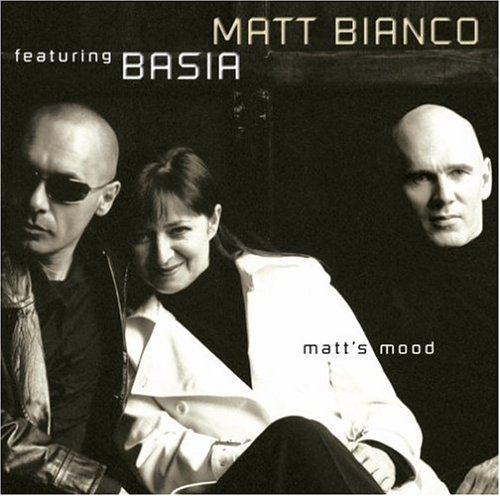|
|
Post by tufta on Apr 21, 2011 20:34:05 GMT 1
I'm so sorry
I'm not sorry
Both contradictory hits are sentimental to my mind/soul!
|
|
uncltim
Just born
 I oppose most nonsense.
I oppose most nonsense.
Posts: 73
|
Post by uncltim on Apr 22, 2011 17:21:12 GMT 1
I apologize in advance.  |
|
|
|
Post by valpomike on Apr 22, 2011 19:00:51 GMT 1
Good music, I just wish I knew what they are saying. But not the great Polish Jazz.
Mike
|
|
|
|
Post by pjotr on Apr 22, 2011 22:28:45 GMT 1
|
|
|
|
Post by pjotr on Apr 22, 2011 22:32:39 GMT 1
|
|
|
|
Post by tufta on Apr 22, 2011 22:40:43 GMT 1
I'm so sorry. I'm not sorry That's the best idea!  We have a song about that too. But it is in Polish. You'll have to use your imagination listening to the tune and voice of the singer. I love this song - my wife sings it to me when I am down, or mad, always works!  |
|
|
|
Post by pjotr on Apr 22, 2011 22:45:42 GMT 1
Do you remember this eightees hit guys?
Matt Bianco
Matt Bianco is a UK band that was formed in 1983. They are mainly known for their success in the mid 1980s and their jazz, Latin-flavoured music.
Popular during the mid 1980s in continental Europe, Matt Bianco was part of the new jazz pop genre, that they shared with acts such as Working Week, Sade, Everything but the Girl, and The Style Council. The name suggests that Matt Bianco is a personal name, often referred to the main constant member and frontman, Mark Reilly, but Matt is in fact "a made up spy, a secret agent; we loved spy TV themes and film scores".
[edit] The early years as a trio
Formed by Mark Reilly (vocals), Danny White (keyboards), and the late Kito Poncioni (bass) in 1982 from the shards of the abandoned art pop group, Blue Rondo A La Turk, for their first album, Whose Side Are You On?, they hired then unknown Polish vocalist Basia Trzetrzelewska. Her vocal arrangements gave the album a jazzy dimension. Mixmaster Phil Harding applied what would become his signature style to the recordings. Hits like "Get Out of Your Lazy Bed" and "Half a Minute," which Basia would feature live throughout her solo career, turned Matt Bianco into one of the biggest acts of Europe in 1984.
Basia and Danny White, who subsequently formed a romantic relationship, left the group soon after the first album to pursue a solo career with Sony, under the name Basia, on the Epic label. They maintained their working relationship with Phil Harding, who continued to work with Matt Bianco as well.
Reilly found two new musical partners: Jenny Evans became the new female singer for Matt Bianco, contributing mainly backing vocals, and lead vocals on two album tracks, and ex-Wham and Second Image keyboarder and session musician Mark Fisher became White's collaborator as songwriter and producer, and the band's keyboard player. This line-up recorded the (self-titled) Matt Bianco album.
The Reilly-Fisher duo years
With the addition of Mark Fisher, the sound changed considerably. Fisher, a keyboardist, composer and studio wizard, contributed a more contemporary sound, compared to that of the early Matt Bianco. The use of synthesizers increased notably: Yamaha's DX-7 can be heard providing the slap bass in most songs, but the choice of noted studio musicians remained consistent with Ronnie Ross being the most prominent example. After the first album with the new line-up, they took a 13-piece band on to a European tour, that saw them perform in front of an audience of more than 250,000 attendees in total.
Jenny Evans left the group shortly after the recording of the group's self titled album and was not replaced.
Matt Bianco was now a household name in Europe, and Warner Brothers sought to market them in the United States. They hired Gloria Estefan's husband and producer Emilio Estefan to produce a few songs, and recorded their third album, Indigo, with the Estefan productions being chosen as singles. 1988's "Don't Blame it on That Girl" and "Good Times" only made a moderate impact. "Wap-Bam-Boogie", an album track originally on the B-side of the first single , which did well on the dance charts, and pushed the joint single release up to Number 11 on the UK Singles Chart, making it Matt Bianco's most successful single.
Their first Greatest Hits album, entitled The Best of Matt Bianco, collecting their greatest hits from 1983 to 1990, was released in 1990. Another studio album was released in 1991 by Warner Brothers, the fractured Samba in Your Casa, the fourth long-playing by the group.
Reilly and Fisher then split from their record company and went freelance. From then on, they recorded their albums in their own studios, and then offered them to independent distributors worldwide.
They scored contracts with ZYX Music and Intercord in Europe, and Victor Entertainment in Asia, but failed to sign on with another major label. The next albums did not sell well in Europe, but they created a loyal fan base in Japan and the rest of Asia. The albums Another Time Another Place, Gran Via, World Go Round, A/Collection (not a greatest hits album, but more of a compilation album, compiling a number of remakes of Matt Bianco's stand-out album tracks plus remixes of a few of their hits), Rico, and Echoes sold well enough for a comfortable lifestyle in the South-East of England.
After twenty years recording and touring, the two split amicably.
The reunion of the original trio line-up
Initiated by a mutual friend, Basia and Danny White joined with Mark Reilly to reform the "original" Matt Bianco, in 2003, signing to the Emarcy label. In 2004, Matt Bianco released the album Matt's Mood (the name is from one of their most popular early instrumental tracks), which featured well-crafted adult-contemporary/jazz numbers, in the spirit of their first album. This was accompanied by an extensive PR exercise, giving the album plenty of airtime. The following year, they embarked on a world tour, which included stops in the UK, Japan, and the United States.
The present: back again to the duo
After the success of Matt's Mood, Basia and White left Matt Bianco again to reinvigorate the Basia brand. Reilly reunited with Fisher, and Matt Bianco were back as a duo. Three compilation albums were marketed between 2005 and 2008, including The Best of Matt Bianco - Volume 2, containing many of the Asian tracks, which were so far only available in Germany for European fans, and the re-release of the original 1990 The Best of Matt Bianco, featuring their European hits from 1983 to 1990. In May 2009 Fisher and Reilly released their first album as a duo for eight years in Europe, the UK and Japan. With HiFi Bossanova the band secured a recording contract with Edel Music in Europe and continued their cooperation with JVC-Victor in Japan.
|
|
|
|
Post by pjotr on Apr 22, 2011 22:57:17 GMT 1
Basia Basia Trzetrzelewska Basia Trzetrzelewska (born September 30, 1954) is a Polish singer-songwriter and record producer. She established a successful international recording career featuring characteristically Latin-flavoured jazz-pop crossover songs during the late 1980s and early 1990s, particularly in the United States, the United Kingdom, France, and Japan. She is noted for possessing a wide vocal range, approximately three octaves that span from contralto to soprano tessituras, as well as her singular jazz-influenced stylings and multi-layered harmonies. Biography Basia was born in Jaworzno, Poland. In 1969, she debuted with her local amateur rock band Astry and performed with them on Polish Festival of Beat Avangarde in Kalisz. From 1972 to 1974, she was a member of the popular Polish female vocal group Alibabki. From 1977 to 1979, she sang with the rock band Perfect. Settling temporarily in Chicago in 1979, she later relocated to London in 1981. It was there she met Mark Reilly and longtime collaborator Danny White (brother of jazz guitarist Peter White). In 1983, the trio performed as the jazz-pop group Bronze but later changed their name to Matt Bianco and recorded their debut album Whose Side Are You On?, released in 1984. That album was a hit across Europe, selling more than 1.5 million copies and then bringing two Top 30 hits on the UK Singles Chart: " Get Out of Your Lazy Bed" and " Half a Minute".  In 1985, Basia and Danny White left Matt Bianco to launch her solo career. In 1987 her first album Time and Tide was released selling almost two million copies. As a solo artist Basia achieved greatest success in the United States, where she sold over one million units of her debut album. It also brought her the U.S. Top 30 hit " Time and Tide" on the Billboard Hot 100 chart. In 1989 her second album, London Warsaw New York, repeated that accomplishment. It also sold almost two million units including more than one million in the U.S. and featured another Top 30 hit on the Billboard Hot 100, " Cruising for Bruising". The video for " Until You Come Back to Me" also featured on the hit album contains footage shot in Seattle, with scenes including the ever debated Alaskan Way Viaduct and the landmark Paramount Theatre. Both albums topped Billboard's Top Contemporary Jazz Albums, but her second album also became Top Contemporary Jazz Album of the Year even beating the Grammy Award-winning Album of the Year, Back on the Block, from Quincy Jones. While achieving great success in the U.S. market Basia also became a very popular artist in Asia (mainly in Japan), Europe and especially in France. In 1991 she released her first long-form video A New Day containing all her videos and an interview.  Her third studio album, The Sweetest Illusion, was released in 1994 and was a moderate success in the U.S. market selling over half-million copies but globally it became another million-seller. Mixed by the then-highly sought after David Bascombe (who had contributed to Oleta Adams' debut effort) the project marked the end of a ten-year working relationship with mixmaster Phil Harding and a step into more sophisticated territory. The Sweetest Illusion included a number-one hit on the Billboard Hot Dance Club Play chart, " Drunk on Love". Her next album, Basia on Broadway, was a live-set recorded at the Neil Simon Theatre in New York City and was released in 1995. In 1996, Basia was featured on Peter White's album Caravan of Dreams with vocals on the single " Just Another Day". In 1998 a retrospective compilation album Clear Horizon - The Best of Basia was issued and contained some rare and new material including a cover of " Waters of March", written by Brazilian composer Antonio Carlos Jobim. Despite a successful international career and faithful fan base she withdrew from the recording industry in 1998, after the release of her collection of greatest hits, with the sole exception of a guest appearance on Taro Hakase's cover of " So Nice (Summer Samba)" in 1999. She would later cite the deaths of people close to her, including her own mother, as the reason she " didn't feel like singing". After some persistent efforts from Danny White and Mark Reilly who had started working together again, she agreed to join a re-formed Matt Bianco. They released the album Matt's Mood in 2004 to critical acclaim. After touring to promote the album Basia and Danny White began work on a new Basia project while Reilly continued with Matt Bianco.  In 2009, after nearly fifteen years, Basia returned with her fourth studio album, It's That Girl Again, first released in Japan on 11 March then in the U.S. on 24 March, in Europe (only on iTunes) on 30 March - in her native Poland on 17 April, in Singapore on 24 May, in Malaysia on 1 June, in Thailand on 23 June and in Indonesia. First leg of tour promoting this album began on 28 September in Europe and ended on 19 October in Japan. As of Spring of 2010 Basia was participating in the World Rhythms Tour with Bernie Williams. The second leg of her tour began on 3 May, 2010 in Europe and ended on 6 June in the U.S.A. (including a performance at Jacksonville Jazz Festival in Florida). The third leg will begin on 9 September in Europe, in October she will tour Indonesia and Singapore and return to the U.S. in November.
|
|
|
|
Post by tufta on Apr 22, 2011 22:57:24 GMT 1
Basia Trzetrzelewska! Great name for international carriere  But she never changed it. I like women with guts  Men too. |
|
|
|
Post by pjotr on Apr 22, 2011 23:17:31 GMT 1
I'm so sorry. I'm not sorry That's the best idea!  We have a song about that too. But it is in Polish. You'll have to use your imagination listening to the tune and voice of the singer. I love this song - my wife sings it to me when I am down, or mad, always works!  I wish I had a girlfriend like that, you are a lucky guy!  ;D  |
|
|
|
Post by pjotr on Apr 22, 2011 23:36:19 GMT 1
The Italians like the Poles are great in romantic songs with their mediteranian climate, old Southern-Catholic culture, voluptious Brunette women, stile, elegance, grace and Joie de vivre!
|
|
|
|
Post by pjotr on Apr 22, 2011 23:38:29 GMT 1
|
|
|
|
Post by pjotr on Apr 22, 2011 23:55:15 GMT 1
|
|
|
|
Post by pjotr on Apr 23, 2011 0:10:58 GMT 1
Tufta,
As a Northern-European I love the estheticism of Southern-Europeans, the Southern-French, the Spanish, the Portugese (especialy the Portugese, with their langauge, cuisine and culture. I loved the Azores), the Mediteranian Islands, the Italians, Serbs, Croats, Slovenes, Bosniacs, Macedonains, Albanians, the Greeks, Turks and Kurds. They have a dynamic street culture in their squares, alleys, streets, boulevards, parks and gardens. We live more inside, they live more outside. They have a more family oriented, group or clan culture, we a more individualistic one. I like the Italian family and community culture. In the Netherlands Italians are workers, restaurant or ice cream shop owners.
I felt great in Toscane and Umbria, especially Umbria, I loved all the Italians cities I visited, Piza, Florence, Perugia, Arezzo, Rome, Venice and Milan (eventhough I only went by thrain through the latter). It's the refined merger of nature and human endeavor (In the Roman and Italian architecture, fine arts and Italian quality products; food, cars, Fashion, and the quintessence of life there. The Italian family, the Italians as a people and the Italian atmosphere which has something unique. Each people have some unique things, but to me Italy has something special in Europe. Maybe it is because it is the core of our Roman civilization (Spanish, French and Portuges are in fact Roman, Latin dialects of regions of the Roman empire which developped to latin languages).
I like a few Italian songs, but mostly listen to English, French and since the Polish forums Polish music too!
Pieter
|
|
|
|
Post by pjotr on Apr 23, 2011 13:05:52 GMT 1
Basia Trzetrzelewska has that Southern European stilish, natural grace and elegance of the Italian, Southern-French and Portugese women, or the nice ones from Latin America!
A warm, sensual and cool voice in the same time, exellent!
|
|
|
|
Post by pjotr on Apr 23, 2011 13:09:42 GMT 1
Krzysztof Komeda paintings by Zdzisław Beksiński Very subtle, refined, fine and wonderful atmosphere and feeling song. It was nice to watch the Paintings of Zdzis³aw Beksiñski, while watching it. Now my mother comes to see and listen! |
|
|
|
Post by valpomike on Apr 23, 2011 18:15:01 GMT 1
I have heard Basia's stuff, in the past, and she is great, so is the rest of the stuff. Thank you both.
Mike
|
|
|
|
Post by pjotr on Apr 23, 2011 21:50:15 GMT 1
Basia Trzetrzelewska has that Southern European stilish, natural grace and elegance of the Italian, Southern-French and Portugese women, or the nice ones from Latin America! A warm, sensual and cool voice in the same time, exellent! Beacause we are at the crossroads my dear Pieter, which you know very very well!  Michał Lorenc - Taniec Eleny Tufta, Wonderful instrumental folk song like band, melody and rythm. It was a joy to watch the images! Yes, all parts of Europe come together in Poland and Poles went to all parts of Europe made their contribution there and took things back home too. Today Polish musicians, artists, professionals, scientists, politicians, officers and soldiers play a role in the world and in Europe. *Poland is in the world and the world is in Poland. Pieter * The Polish science, culture, classical music, militairy assistance to others -from the American Revolution, the second world war to Haïti where Polish special forces protected Americna generals in the ninetees, and Afghanistan, Iraq and Africa. * The Roman-Catholic church, faith and culture is an international community, network and movement. |
|